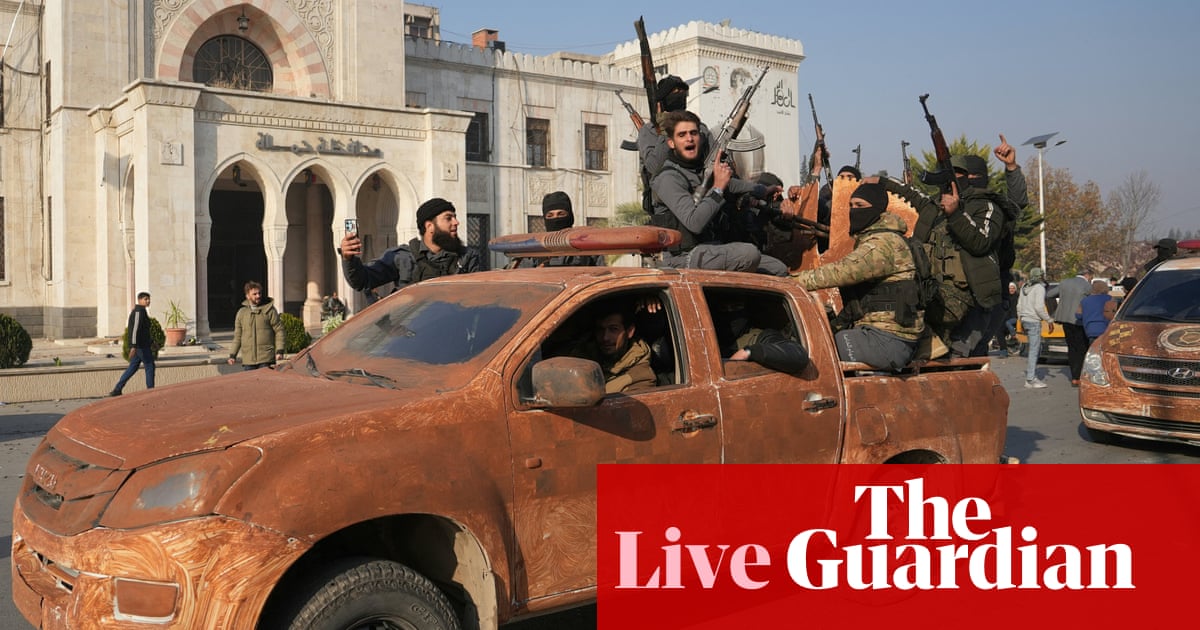Thousands flee as Syrian rebels push on towards Homs
Thousands of people fled the central Syrian city of Homs overnight and into Friday morning, a war monitor and residents said, as rebel forces sought to push their lightning offensive against government forces farther south.
They have already captured the key cities of Aleppo in the north and Hama in the centre, dealing successive devastating blows to president Bashar al-Assad, nearly 14 years after protests against him erupted across Syria.
The Syrian Observatory for Human Rights, a UK-based war monitor, said thousands of people had begun fleeing on Thursday night towards Syria’s western coastal regions, a stronghold of the government.
According to Reuters, a resident of the coastal area said thousands of people had begun arriving there from Homs, fearing the rebels’ fast-paced advance.
On Friday morning, Israeli airstrikes hit two border crossings between Lebanon and Syria, Lebanon’s transport minister, Ali Hamieh, said.
The Syrian state news agency, Sana, said the Arida border crossing with Lebanon was out of service due to the attack. The Israeli military said it had attacked weapons transfer hubs and infrastructure overnight on the Syrian side of the Lebanese border, saying these routes had been used by the Lebanese armed group Hezbollah to smuggle weapons.
Russian bombing overnight also destroyed the Rustan Bridge along the key M5 highway, to prevent rebels from using this main route to Homs city, a Syrian army officer told Reuters.
“There were at least eight strikes on the bridge,” he added. Government forces were working to strengthen positions around Homs city with fresh reinforcements, he said.
Rebels led by the Islamist faction Hayat Tahrir al-Sham had pledged to move on to the central city of Homs, a crossroads city that links the capital Damascus to the north and Assad’s heartland along the coast.
“Your time has come,” said a rebel operations room in an online post, calling on Homs residents to rise up in revolution.
More on that in a moment, but first, here are some of the other latest developments:
-
The Syrian Observatory for Human Rights, which relies on a network of sources in Syria, said 826 people, mostly combatants but also including 111 civilians, have been killed in the country since the violence erupted last week. It marks the most intense fighting since 2020 in the civil war sparked by the repression of pro-democracy protests in 2011.
-
Iran says it conducted a successful space launch, the latest for its program the west alleges improves Tehran’s ballistic missile programme. Iran conducted the launch using its Simorgh programme, a satellite-carrying rocket that had seen a series of failed launches. The launch took place at Iran’s Imam Khomeini Spaceport in rural Semnan province. There was no immediate independent confirmation Friday the launch was successful.
-
Iraqi foreign minister, Fuad Hussein, will meet his Syrian and Iranian counterparts on Friday to discuss the situation in Syria, the Iraqi state news agency said on Thursday.
-
A Hamas official said on Thursday that international mediators have resumed negotiating with the militant group and Israel over a ceasefire in Gaza, and that he was hopeful a deal to end the 14-month war was within reach. Ceasefire negotiations were halted last month when Qatar suspended talks with mediators from Egypt and the US because of frustration over a lack of progress between Israel and Hamas.
-
Russian foreign minister, Sergei Lavrov, has said that he plans to hold talks on Friday with Turkish and Iranian officials on the situation in Syria. On Thursday, Lavrov said Moscow was “very much concerned” with a recent escalation of violence in Syria.
Key events
The head of US-backed Syrian Kurdish force said on Friday that Islamic State group had taken control over some areas in eastern Syria.
“Due to the recent developments, there is increased movement by Islamic State mercenaries in the Syrian desert, in the south and west of Deir Al-Zor and the countryside of al-Raqqa,” Mazloum Abdi said in a press conference, referring to areas in the east of the country, according to Reuters.
North Gaza hospital director says Israeli strikes hit facility
The director of north Gaza’s Kamal Adwan hospital said Israel conducted several strikes on Friday that hit the facility, one of the last functioning health centres in the area, reports Agence France-Presse (AFP).
“There was a series of airstrikes on the northern and western sides of the hospital, accompanied by intense and direct fire,” Hossam Abu Safieh said, adding that four staff were killed and no surgeons were left at the site.
UN says Syria fighting has displaced 280,000 people since 27 November
The escalation in fighting in Syria has displaced about 280,000 people in just over a week, the UN said on Friday, warning that numbers could rise to 1.5 million.
“The figure we have in front of us is 280,000 people since 27 November,” Samer AbdelJaber, head of emergency coordination at the UN’s World Food Programme (WFP), told reporters in Geneva. “That does not include the figure of people who fled from Lebanon during the recent escalations” in fighting there, he added.
The mass displacement has happened since rebels led by Hayat Tahrir al-Sham (HTS) launched their lightning offensive a little more than a week ago. That occurred just as a tenuous ceasefire in neighbouring Lebanon took hold between Israel and Syrian president Bashar al-Assad’s ally Hezbollah.
WFP warned that the fresh mass-displacement inside Syria, more than 13 years after the country’s civil war erupted, was “adding to years of suffering”.
AbdelJaber said the WFP and other humanitarian agencies were “trying to reach the communities wherever their needs are”, and that they were working “to secure safe routes so that we can be able to move the aid and the assistance to the communities that are in need”.
He also stressed the urgent need for more funding to ensure humanitarians are “ready for any scenario basically in terms of displacements that could evolve in the coming days or months”.
According to AFP, AbdelJaber cautioned that “if the situation continues evolving (at the current) pace, we’re expecting collectively around 1.5 million people that will be displaced and will be requiring our support”.
Syria’s army backed by warplanes, including from ally Russia, were targeting “terrorist vehicles and gatherings” in Hama province on Friday, the defence ministry said, amid a major rebel offensive, reports Agence France-Presse (AFP).
“Our armed forces are targeting terrorist vehicles and gatherings in the north and south of Hama province using artillery, missiles and joint Syrian-Russian warplanes,” a ministry statement said, citing a military source.
Rebel military commander Hassan Abdel Ghani said in a statement on Telegram on Friday that “our forces continue to march steadily towards the city of Homs”, reports Agence France-Presse (AFP).
He said “hundreds” of fighters who had been forced to leave Homs years ago after the government retook it had returned “to deter Assad’s aggression against their city”.
Homs was once dubbed the “capital of the revolution” because of the large-scale protests in the city when Syria’s uprising began in March 2011.
The UK-based Syrian Observatory for Human Rights said tens of thousands of residents were fleeing Homs on Thursday towards the coast, fearing the rebel advance (see 7.41am GMT).
Syria rebel leader says goal is to ‘overthrow’ Assad
The leader of an Islamist rebel alliance driving a lightning offensive in Syria has said the goal of the campaign is to overthrow the government of president Bashar al-Assad, reports Agence France-Presse (AFP).
“When we talk about objectives, the goal of the revolution remains the overthrow of this regime. It is our right to use all available means to achieve that goal,” Abu Mohammed al-Jolani told CNN in an interview published on Friday.
Israel says it struck Hezbollah ‘smuggling routes’ on Syria-Lebanon border
Israel’s military said on Friday that it carried out strikes overnight targeting Hezbollah “weapon-smuggling routes” on the Syria-Lebanon border, just over a week into a fragile ceasefire in its war with the Lebanese group.
Official media in both Lebanon and Syria reported that the air raid put the al-Arida border crossing – already hit during the Israel-Hezbollah war – out of service.
The Israeli air force “conducted strikes on weapon-smuggling routes and terror infrastructure sites located near the Syrian regime’s crossings at the Syrian-Lebanese border”, the military said in a statement that included a map identifying one of the targets as the al-Arida crossing, reports Agence France-Presse (AFP).
Syrian state news agency, Sana, said that “the al-Arida border crossing between Syria and Lebanon is out of service again due to an Israeli attack that targeted it” early on Friday.
According to AFP, Lebanon’s official National News Agency said the strike “led to damage to infrastructure” and cut off the border road “again after the bridge was repaired” following a previous attack.
Israel has struck border crossings between Syria and Lebanon numerous times, saying it aims to prevent weapons smuggling from Syria into Lebanon. The latest strike came amid mutual accusations between Israel and Hezbollah of violating the terms of a ceasefire agreement that came into effect on 27 November.
Rebels 5km away from Homs, says Syria war monitor
A monitor of Syria’s war said rebels were just 5km (3 miles) from third city Homs on Friday, after controlling two strategic towns on the road linking it to Hama, reports Agence France-Presse (AFP).
“Hayat Tahrir al-Sham (HTS) and allied factions have reached five kilometres from the outskirts of Homs city after controlling the towns of Rastan and Talbisseh,” said the Syrian Observatory for Human Rights, adding that controlling Homs would allow the rebels to “cut off the main road leading to the Syrian coast”, the stronghold of president Bashar al-Assad’s Alawite minority.
Thousands flee as Syrian rebels push on towards Homs
Thousands of people fled the central Syrian city of Homs overnight and into Friday morning, a war monitor and residents said, as rebel forces sought to push their lightning offensive against government forces farther south.
They have already captured the key cities of Aleppo in the north and Hama in the centre, dealing successive devastating blows to president Bashar al-Assad, nearly 14 years after protests against him erupted across Syria.
The Syrian Observatory for Human Rights, a UK-based war monitor, said thousands of people had begun fleeing on Thursday night towards Syria’s western coastal regions, a stronghold of the government.
According to Reuters, a resident of the coastal area said thousands of people had begun arriving there from Homs, fearing the rebels’ fast-paced advance.
On Friday morning, Israeli airstrikes hit two border crossings between Lebanon and Syria, Lebanon’s transport minister, Ali Hamieh, said.
The Syrian state news agency, Sana, said the Arida border crossing with Lebanon was out of service due to the attack. The Israeli military said it had attacked weapons transfer hubs and infrastructure overnight on the Syrian side of the Lebanese border, saying these routes had been used by the Lebanese armed group Hezbollah to smuggle weapons.
Russian bombing overnight also destroyed the Rustan Bridge along the key M5 highway, to prevent rebels from using this main route to Homs city, a Syrian army officer told Reuters.
“There were at least eight strikes on the bridge,” he added. Government forces were working to strengthen positions around Homs city with fresh reinforcements, he said.
Rebels led by the Islamist faction Hayat Tahrir al-Sham had pledged to move on to the central city of Homs, a crossroads city that links the capital Damascus to the north and Assad’s heartland along the coast.
“Your time has come,” said a rebel operations room in an online post, calling on Homs residents to rise up in revolution.
More on that in a moment, but first, here are some of the other latest developments:
-
The Syrian Observatory for Human Rights, which relies on a network of sources in Syria, said 826 people, mostly combatants but also including 111 civilians, have been killed in the country since the violence erupted last week. It marks the most intense fighting since 2020 in the civil war sparked by the repression of pro-democracy protests in 2011.
-
Iran says it conducted a successful space launch, the latest for its program the west alleges improves Tehran’s ballistic missile programme. Iran conducted the launch using its Simorgh programme, a satellite-carrying rocket that had seen a series of failed launches. The launch took place at Iran’s Imam Khomeini Spaceport in rural Semnan province. There was no immediate independent confirmation Friday the launch was successful.
-
Iraqi foreign minister, Fuad Hussein, will meet his Syrian and Iranian counterparts on Friday to discuss the situation in Syria, the Iraqi state news agency said on Thursday.
-
A Hamas official said on Thursday that international mediators have resumed negotiating with the militant group and Israel over a ceasefire in Gaza, and that he was hopeful a deal to end the 14-month war was within reach. Ceasefire negotiations were halted last month when Qatar suspended talks with mediators from Egypt and the US because of frustration over a lack of progress between Israel and Hamas.
-
Russian foreign minister, Sergei Lavrov, has said that he plans to hold talks on Friday with Turkish and Iranian officials on the situation in Syria. On Thursday, Lavrov said Moscow was “very much concerned” with a recent escalation of violence in Syria.



